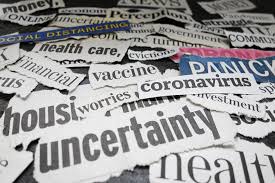- An Open Letter to ‘our friends in media’
- COVID related news should be balanced
- Don’t compromise on facts or public interest
New Delhi: Dr. Gangadhar, president, Ethics and Medical Registration Board and some other psychiatric experts have released an open letter to media friends appealing to show restraint in the coverage of events during the Covid pandemic. They, however, said there need not be compromise on facts and public interest. Their concern was about the health of the people who are mentally weak and the consequences. Here is the full text of the letter:
“Dear News Media outlets
“As professionals working in mental health domains, we felt compelled to write an open letter to everyone, especially our friends in media, on the events of the past few weeks.
“With great power comes great responsibility, it is said. In an unprecedented crisis such as COVID 19 pandemic, responsibility acquires even greater importance.
“Mass media has the power to communicate to millions at the same time. When the reach is so huge, every word, every image, every nuance matters. However, what we are seeing on TV screens, mobile screens and newspapers is disconcerting to put it very mildly.
“Images of bodies burning in cremation grounds, relatives of the deceased wailing inconsolably, emotional outbursts and hysterical reporters with cameraman swarming over the bereaved who are going through deeply emotional moments-these may help garner eye balls, but there is a steep price to be paid for such coverage.
“As it is, due to the pandemic-related restrictions and guidelines, people are unable to go out and live a normal social life. This is already fostering a hidden mental health epidemic, with people becoming depressed, lonely and anxious. Stuck at home, people turn to the television or social media even more than earlier. But when they see such disturbing, depressing visuals, they are pushed much deeper into the abyss.
“We are sure that reporting on sensitive issues, especially during the time of difficulty is not easy, even for the journalists. If the news you are reporting affects you so much, imagine the impact it has on the people who are watching.
“Imagine someone has just tested positive for COVID 19, if they have witnessed the panic-including the coverage from cremation grounds, it keeps weighing on their minds and that of their loved ones. The fact that a huge number of people who are infected by COVID-19 recover becomes immaterial. Only images and emotions stay with them.
“There are many people with mild or moderate COVID 19 who may be recovering at home. Will a positive frame of mind helps them recover better or will an atmosphere of hopelessness do so? This is matter for our friends in media to reflect upon.
“Yet again, we are not saying that facts should not be reported. We are saying that hysteria and panic inducing coverage should be avoided. Apart from harming people’s mental health such reportage also has other consequences.
“Reporting a shortage of one particular commodity is the right thing to do so that action can be taken. But it also needs to be specified where exactly the shortage is, rather than make it looks like a universal shortage. Because human psychology is such that, the more noise people hear about shortages, the more they will run after that commodity and try to hoard it. This creates a vicious cycle of more shortages of people panicking because they are unable to get thing they may not even need.
“As mental health professionals, we can tell you that specific information empowers people and prepare them to face any challenge. But panic weakens them.
“When are certain medicines needed? When do patients look for oxygen? When should they go to a hospital? What percentages of people recover from COVID 19 just while being at home? Are there organisations working to help people even at such times? Are there hopeful stories of triumph? How can people seek help in times of emergency? Many of these may not be clear to most common people even after watching hours of news. Perhaps these aspects can be emphasised upon prominently.
“Remember, that none knows about the exact mental health situation of every person who is watching you or reading you. There is no way to say which image or which word can be the last straw for someone, causing grievous damage to their mental health. Therefore, responsibility matters. In such times, the media has great power to inform, educate and most importantly, infuse hope in the people. This includes the sharing authentic information and allaying of fears. These are extremely important weapons in this fight against the pandemic. Therefore we request our friends in the media to show restrain in their coverage without compromising upon facts or public interest.
“You are our eyes and ears. You matter. What you say, show or write matters. You are important partners along with frontline workers both in healing process and providing hope, as well as support for those in grief”.
Signed by
Dr. Gangadhar, President, Ethics and Medical Registration Board
Dr. Prathima Murthy from NIMHANS, Bangalore
Dr. Gautam Saha, President, Indian Psychiatric Society
Dr. Rajesh Sagar,AIIMS
[




